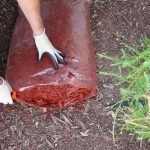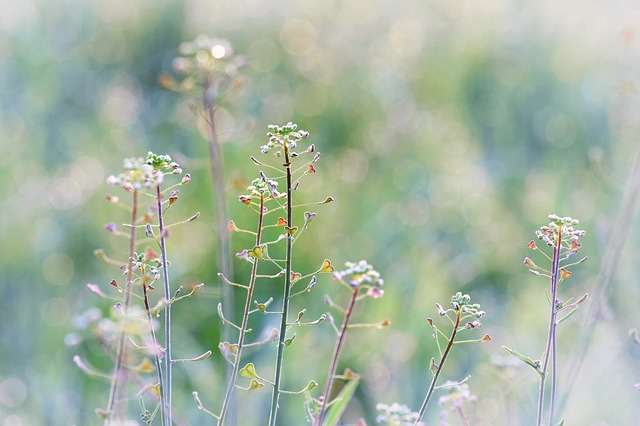Weeds and pests are a fact of life in gardens, an issue we struggle year after year to overcome. Successes and setbacks occur, as new weed seeds enter our landscape.
Weed seeds that have plagued us before return, especially when we dig around in our soil. Birds drop seeds, and they sometimes blow in from another area. No matter their origin, we want them gone. Following is a combination of tips and tricks to stop weed seeds from sprouting in your flowerbeds and gardens.
Of course, chemical control is the last step on our list of ways to stop weeds from sprouting. We can, however, learn how to make organic weed killer that is chemical free.
There are many recipes on the web, but we’ll offer one here with variations to encompass the whole gamut of weed problems. Best of all, the ingredients are inexpensive and likely already in your kitchen. You’ll need white vinegar, table salt (the cheap kind) and dishwashing liquid. You’ll also need a sprayer to apply your organic weed killer. Any spray bottle will work.

How To Make Organic Weed Killer
Organic Weed Killer – Where You Will Replant
Add a tsp of dish soap to a gallon of vinegar. Mix this in the sprayer, and you’re ready to tackle weeds in areas where you’ll replant later.
Spray when the sun is hitting the weeds. Use this mix to spray between rows in the garden. For those weeds closer to your garden plants, pluck them out by hand, you don’t want the vinegar mix too close to your vegetables.
Depending on the weeds, you might have to apply more than once. Try to saturate the roots; this is what gets rid of the weed. Do not replant until the weeds have died.
Organic Weed Killer – Where You Won't Plant
For areas where you have no future planting plans, combine a cup or two of salt with the gallon of vinegar and add a tablespoon of dish soap. The soap in this recipe helps the vinegar cling to the weeds, so use your best judgment according to the size of your sprayer and how much vinegar you use.
Adding the salt makes the solution work in a more permanent way, such as weeds at the edge of the driveway. Avoid the lawn with this mixture.
Preventing Weeds in the Landscape

The best weed in your yard is one that never sprouts. One effective way to make this happen is stopping the sun from reaching the seed.
Landscape fabric, mulch or the two together work to keep weeds from sprouting. Apply landscape fabric on top of the prepared soil before planting. This fabric is a long-term way to keep weeds at bay. Cut planting holes into the material in the shape of a plus sign and plant through them.
After planting, the fabric will fall in place to protect the soil. For larger plantings, such as shrubs or trees, separate the material with a single cut to cover the area. Match it back together without a space, overlap if you must.
Large rocks and boulders appear in many of today's landscape designs. Use these to help hold the landscape fabric in place when possible.
Use the fabric between rows in your vegetable gardens and flower beds for a weed-free planting. Take advantage of inexpensive landscape pins to hold the material in place. Try to keep the top clear of soil to avoid creating a germinating spot for weeds.
Mulch Helps Weeds From Sprouting
Adding mulch on top of the landscape fabric further helps keep weeds from sprouting. Organic wood mulch is attractive when covering beds and gardens throughout your landscape. It is healthy for the soil as it breaks down and adds nutrients.
Shredded wood bark, coconut coir, and pine straw are inexpensive options. Use shredded leaves on rows in the vegetable garden. Mulch does an excellent job without landscape fabric by protecting from weeds and helping to retain moisture in the soil.
Corn Gluten
Some gardeners swear by corn gluten as a pre-emergent, organic control to keep weeds out of the garden. It is a primary ingredient in some pricy products you can purchase, labeled organic.
However, research by the agriculture departments at a few universities questions its effectiveness. Proper timing, watering in, and a lack of subsequent rainfall contribute to the success of corn gluten products. If you’ve used it with success, continue to do so.
Solarize the Soil
For those areas that have not yet been planted or are currently empty, you can solarize the soil to eliminate weed seeds. Make sure you’ve removed any plants you want to keep. Break up the ground as needed for planting and add any amendments. Till and rake until all sticks and stones are removed. Water thoroughly.
Getting the soil moist deep down helps it hold and conduct heat and encourages weed seeds to sprout and meet their demise. Then, cover the land with sheets of clear plastic, such as those you would find in the paint department for a few hot and sunny weeks. This procedure also kills plant pathogens in the soil.
The plastic for the project has to be clear; black does not work as well. Two months is the recommended time frame, according to the Spruce.
Keeping weeds out of the garden is the mark of an experienced gardener.
We’ve learned that weeds compete with our valuable plants for moisture and nutrition. While weed control is an ongoing battle, it is one in which we can keep the upper hand.
Pull weeds from the garden if they are close to the roots of your plants. Cut them down with a mower or weed-eater when convenient.
Keep a bottle of vinegar spray handy to the garden. Make sure to label it, so you don't get it confused with something else. You’ll soon enjoy a weed free garden.
Written by Becca Badgett
Becca is a long- time gardener with a passion for growing organically in the vegetable garden and sharing her experience. She believes everyone should grow a herb garden, inground or in containers and use those herbs on a regular basis to improve overall health. Her passion for growing led her to attend a Horticulture Program at a local community college and share what she’s learned with numerous articles on the web.
She is certified in Greenhouse Management and Operations, Landscape Design and is licensed as an NC Pest Control professional. Take advantage of her expertise through our gardening articles and get your garden growing. She contributed to the book “How to Grow an Emergency Garden”, available on Amazon. Read it free on Kindle Unlimited


